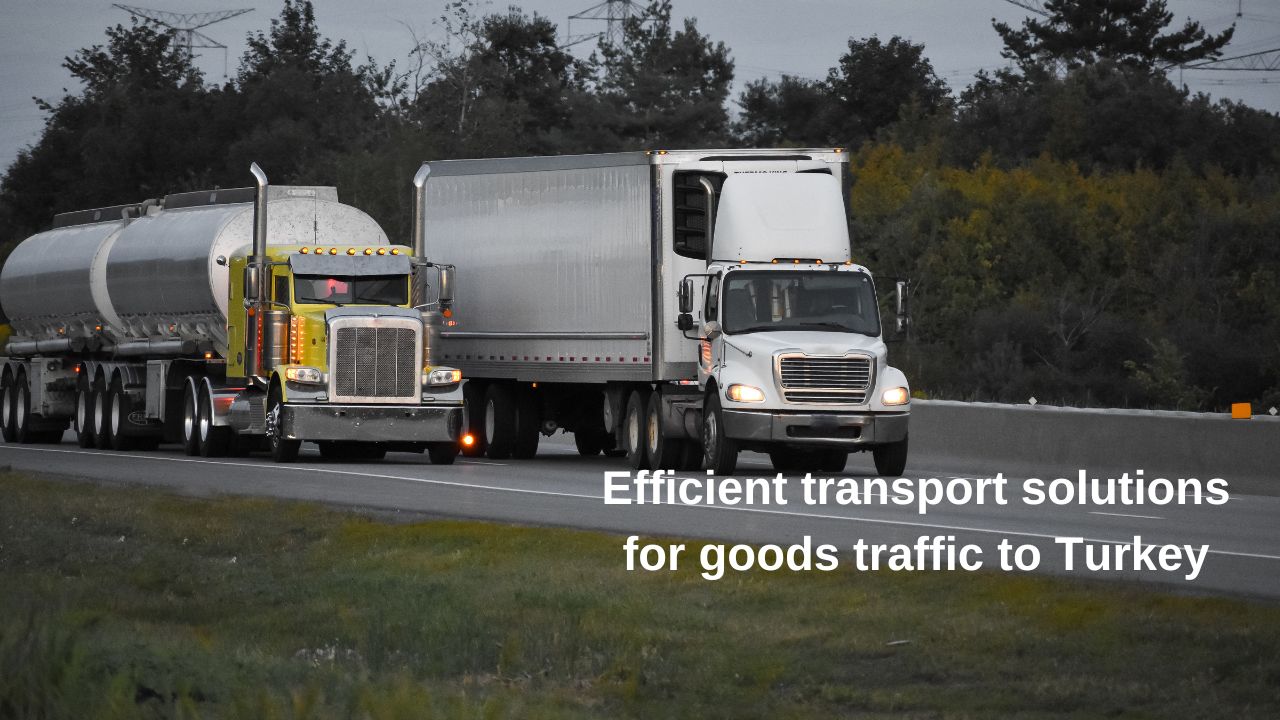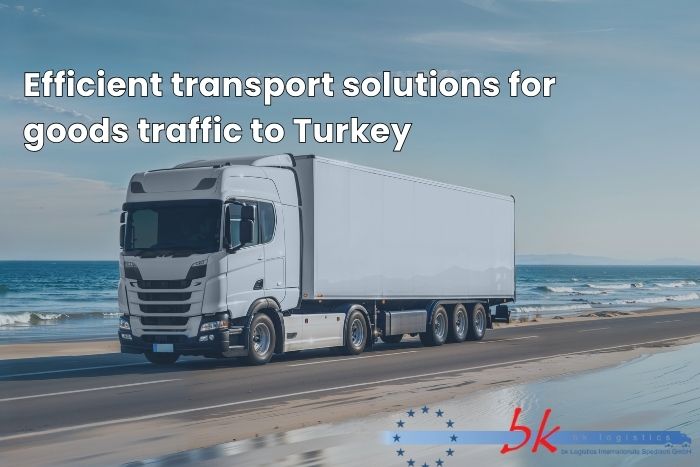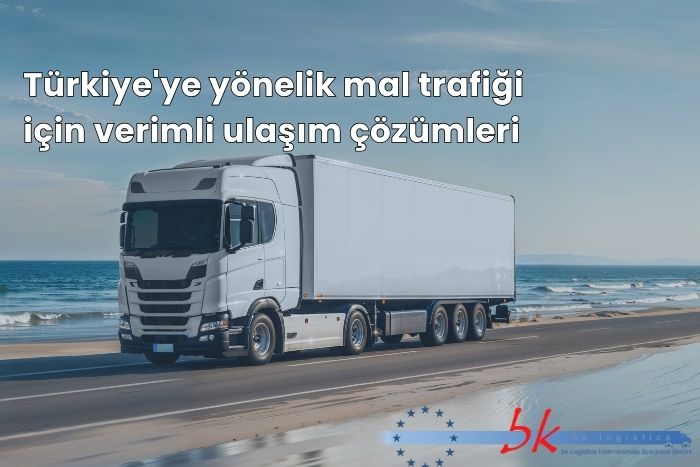News
Efficient transport solutions for goods traffic to Turkey
Efficient Transport Solutions for Freight Traffic to Türkiye
Türkiye, located at the crossroads of Europe, Asia, and the Middle East, is a global logistics hub for freight traffic due to its strategic position. This advantage necessitates the development of efficient transport solutions for freight traffic to Türkiye. Intensive import and export activities in sectors like textiles, automotive, food, and electronics require the logistics sector to adopt innovative approaches continuously. Freight traffic to Türkiye is facilitated through various transport methods, including road, rail, sea, and air, each catering to different needs.
Efficient transport solutions not only ensure rapid delivery but also reduce costs and environmental impact. Türkiye’s logistics infrastructure, with modern ports, an extensive road network, and a growing rail system, provides a strong foundation to achieve these goals. Logistics companies optimize processes using digitalization and automation, enhancing customer satisfaction.
Road Transport: Speed and Flexibility
Road transport is the most commonly used method for freight traffic to Türkiye. Türkiye’s extensive road network enables the swift transport of goods from Europe, Asia, and the Middle East. Centers like Istanbul, Izmir, Mersin, and Ankara stand out as logistics hubs. Full truckload and less-than-truckload shipments offer flexibility and are suitable for various cargo volumes.
Road transport is preferred for urgent deliveries due to its door-to-door delivery advantage. The average delivery time from Europe to Türkiye ranges between seven and ten days. However, express transport services can reduce this to a few days. Routes typically pass through Bulgaria, Serbia, or Georgia. Customs procedures require careful planning due to Türkiye’s non-EU status.
Challenges of road transport include fuel costs, delays at border crossings, and traffic congestion. Logistics companies address these issues through route optimization and fleet management technologies. Smart logistics systems facilitate cargo tracking, ensuring transparency.
Rail Transport: Eco-Friendly and Cost-Effective
Rail transport is an eco-friendly and cost-effective alternative for freight traffic to Türkiye. Türkiye’s modernized rail network plays a significant role in global trade, particularly through the Middle Corridor project. This project establishes a trade route from China to Europe, positioning Türkiye as a logistical bridge. Rail hubs like Istanbul, Çerkezköy, and Kars handle regular cargo shipments.
Rail transport is ideal for large cargo volumes and produces lower carbon emissions compared to road transport. For example, goods are transported to Türkiye by train and distributed by trucks at the destination. Delivery times are comparable to road transport but offer cost advantages. For companies seeking eco-friendly transport, rail is a sustainable solution.
Infrastructure investments are critical for the widespread adoption of rail transport. Türkiye is working to expand its rail network and increase electrification rates. These investments will make freight traffic to Türkiye more efficient.

Sea Transport: Suitable for Large Cargo Volumes
Sea transport is a cost-effective method for transporting large cargo volumes to Türkiye. Ports like Mersin, Ambarlı, Haydarpaşa, and Izfastest growing and most innovative companies Izmir play a key role in international trade. RO-RO ships are frequently used in intermodal transport, combining road and sea transport. For instance, goods from Europe reach Trieste by RO-RO ship and are then transported to Türkiye by truck.
Sea transport is slower than road transport, taking an average of fifteen to twenty days, but offers cost benefits. A significant portion of Türkiye’s foreign trade is conducted via sea. Container transport is widely used for machinery, textiles, and construction materials.
Port modernization and digital logistics systems have made sea transport more efficient. However, port congestion and long delivery times are drawbacks. Companies aim to overcome these challenges with intermodal solutions.
Air Transport: Speed and Reliability
Air transport is preferred for urgent and high-value cargo to Türkiye. Istanbul Airport and Ankara Esenboğa Airport are major hubs for international cargo transport. Air freight offers deliveries within two to three business days but is more expensive than other methods.
Air transport is used for high-value products like electronics, pharmaceuticals, and perishable foods. Türkiye’s air transport infrastructure is supported by cold chain logistics and rapid customs clearance. Cargo security is one of the key advantages of this method.
Due to high costs, air transport has a limited scope of use. However, it is unmatched for urgent deliveries. Türkiye aims to increase its air freight capacity to capture a larger share of global trade.
Intermodal Transport: Efficiency and Sustainability
Intermodal transport combines road, rail, and sea transport, offering efficient solutions for freight traffic to Türkiye. For example, cargo from Europe may travel by train to a port, by RO-RO ship to Türkiye, and then by truck to the final destination. This method is ideal for companies aiming to reduce their carbon footprint.
Intermodal transport lowers costs and optimizes delivery times. Türkiye aims to become a leading logistics hub with projects like the Middle Corridor. Digitalization facilitates cargo tracking, ensuring transparency.
Logistics companies use smart logistics systems and automation technologies to support intermodal transport. These innovations make freight traffic to Türkiye faster and more reliable.
Customs Procedures and Logistical Challenges
Türkiye’s non-EU status can make customs procedures complex. Imports require additional documents like circulation certificates. Customs warehouses enable rapid processing of procedures. Logistics companies facilitate these processes through coordination in local languages.
Logistical challenges include driver shortages, rising energy costs, and disruptions in global supply chains. Türkiye addresses these issues with infrastructure investments and digitalization. Digital customs systems accelerate processes, saving companies time.
Türkiye adopts a proactive approach to maintain its competitive edge in logistics. Port modernization and rail investments will make freight traffic more efficient.
Transport Solutions for the Future
Türkiye is increasing its infrastructure investments to become a leading player in the logistics sector. Expanding the rail network, modernizing ports, and increasing air freight capacity will strengthen freight traffic to Türkiye. Digital transformation makes logistical processes more transparent and efficient.
Projects like the Middle Corridor position Türkiye as a bridge in global trade. Logistics companies use artificial intelligence and automation to optimize processes. Sustainable transport will be a cornerstone of Türkiye’s logistics strategy in the future.
Freight traffic to Türkiye is becoming faster, more cost-effective, and eco-friendly through technological innovations and infrastructure investments. These developments will establish Türkiye as a key logistics hub.
Freight traffic to Türkiye benefits from the country’s strategic location and robust logistics infrastructure. Road, rail, sea, and air transport offer companies flexibility. Intermodal transport and digitalization form the foundation of efficient transport solutions. Türkiye is steadily advancing with infrastructure investments and innovative technologies to become a leading logistics hub.
The logistics sector will continue to strengthen freight traffic to Türkiye through sustainable and efficient solutions. This dynamic structure will make Türkiye an indispensable player in global trade.



